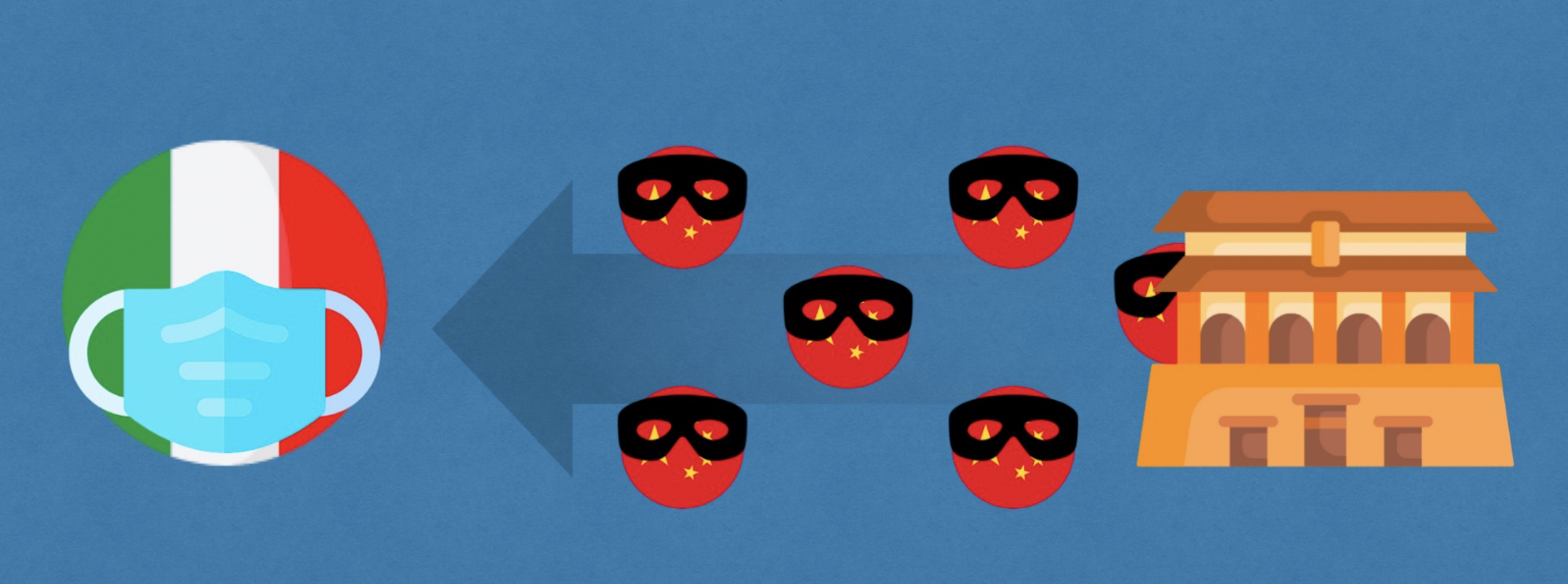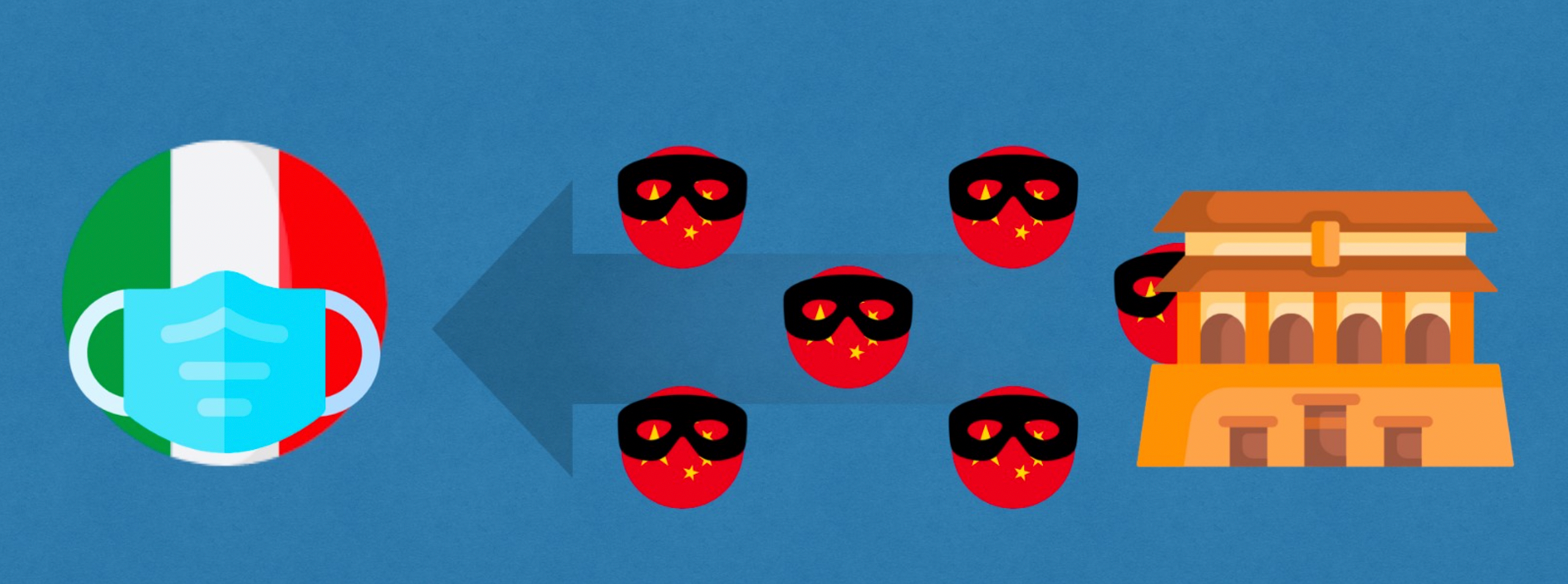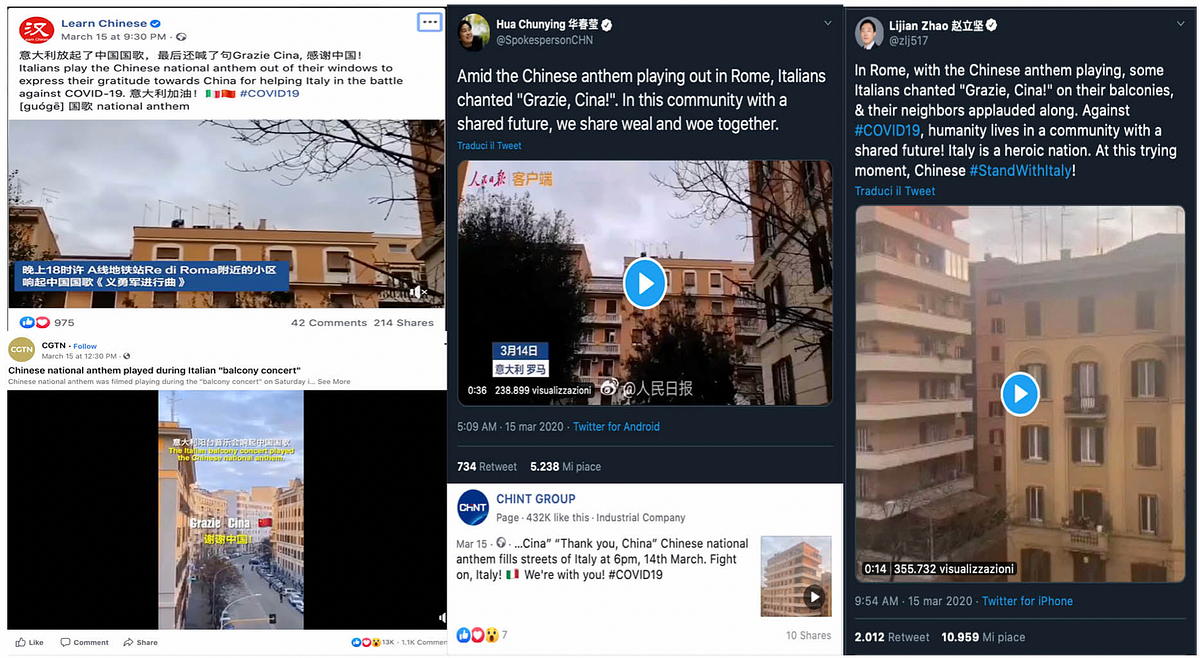China exploits Italian coronavirus outbreak to expand its influence
China is applying a similar disinformation
China exploits Italian coronavirus outbreak to expand its influence

China is applying a similar disinformation playbook to Russia in Italy amid the COVID-19 crisis

This article is part two in a three-part series on how international powers are seizing the COVID-19 outbreak in Italy as an opportunity to increase their influence over Europe.
The situation in Italy, one of the countries hit hardest by the COVID-19 pandemic, is the perfect opportunity for foreign actors to expand their influence, including through the spread of propaganda. Previously, the DFRLab published a report on Russian disinformation targeting Italy and pro-Russian narratives circulating in the Italian and Russian media environment amplified through social media. Another foreign actor — China — has applied a similar playbook to advance its own interests with regard to Italy.
China’s strategy in Italy resembles a traditional influence operation, with sustained lobbying of the Italian government — enabled by the populist Five Star Movement — aimed at establishing economic agreements and long-term relations. With the outbreak of COVID-19 in Italy, China has intensified the amplification of narratives that depict it as a valuable ally and friend, even resorting to artificial amplification techniques learned from other foreign actors — including Russia.
China’s medical aid to Italy to fight COVID-19 was matched by a carefully designed propaganda strategy pushed through official channels, including state media and social media accounts of government representatives. On March 11, the Chinese Embassy in Rome posted from its official account a sympathetic tweet in support of Italy using the hashtag #ForzaCinaeItalia (translated to: #GoChinaAndItaly). According to data from social listening tool Meltwater Explore, content containing that hashtag gained over 60,000,000 impressions on Twitter since March 11.

Italian digital marketing company Alkemy reported that 46.3 percent of the tweets that amplified the hashtag between March 11–23 were shared by bots. In the same timeframe, Alkemy found that bots amplified 37.1% of the content containing the hashtag #GrazieCina (“#ThanksChina”).
Across social media, the hashtag #GrazieCina was often paired with anti-EU content suggesting that, in the COVID-19 crisis, China has been a better ally to Italy than the European Union and the United States. Several Facebook pages, for example, posted the same text:
We spent a month avoiding Chinese people like the plague to then find out that, in the moment of need, countries from the European Union (of which we are a founding State) shut down borders, don’t help you, and take advantage of difficulties, while China sends money, breathing machines, [medical] masks, and suits… remember [this] when everything will go back to normal. Thanks China.

Other memes that became viral on Italian social media over the past few weeks praised China, along with Russia, Cuba, and Albania, for their support to Italy during COVID-19 crisis, while denigrating the aid received from EU countries and the United States. Although most Facebook pages that shared similar memes did not appear political in nature, their millions of followers allowed this content to gain greater visibility.

“Grazie Cina” is also the name of a Facebook page created on March 10, 2020, only two days before China’s medical aid arrived in Italy. With more than 2,000 followers, the page exclusively shares anti-EU memes and amplifies pro-China content originated from government-linked social media accounts and Chinese state media outlets. The page admins share memes that clearly depict the EU as aggravating Italy’s conditions, in contrast to Chinese “saviors.” The news amplified by Grazie Cina build on the same narrative, in posts that mention China as “the only serious and responsible interlocutor [for Italy] to tackle this crisis,” while condemning Germany and other countries for “stealing 800,000 masks” and other medical supplies bound for Italy.

Among other outlets and accounts, the Facebook page Grazie Cina amplified content from Radio Cina Internazionale, the Italian version of Chinese state-owned radio broadcaster China Radio International (CRI). With almost 340,000 followers, Radio Cina Internazionale has shared news on Facebook praising China and its intervention in support of Italy’s fight against COVID-19, glorifying China-Italy cooperation during the crisis, and antagonizing the U.S. for “using this window of opportunity” to constrain China’s economic power and jeopardize China’s relations with other countries.

Another account amplifying pro-China content across social media is the Facebook page Learn Chinese. Ostensibly a language learning platform, Learn Chinese is owned and operated by China Radio International, and its Facebook page redirects to CRI’s official English-language website. Followed by almost 3,000,000 users, Learn Chinese routinely shares success stories from China, including accomplishments in the battle against COVID-19 and advertisement of China’s aid to other countries.

Learn Chinese, along with several other pages, amplified a video reporting “Italians play the Chinese national anthem out of their windows to express their gratitude towards China for helping Italy in the battle against COVID-19.” Three similar versions of the video started circulating around March 14 and were amplified across social media by Chinese government officials and state media. Apart from the accounts of the China Global Television Network, official accounts that amplified the video include Hua Chunying, Spokeperson of China’s Foreign Ministry and Director General of its Department of Information, as well as Lijian Zhao, Spokesman and Deputy Director General of the Information Department of China’s Foreign Ministry.

As Italian debunkers discovered, though, all three videos were not only shot in the same location in Rome, but also featured the same audio, which suggests that it constituted an isolated episode seized on by Chinese propaganda channels, rather than part of a broader trend.
Anna Pellegatta is an Associate Director with the Digital Forensic Research Lab.
Follow along for more in-depth analysis from our #DigitalSherlocks.

